Essays
Essays
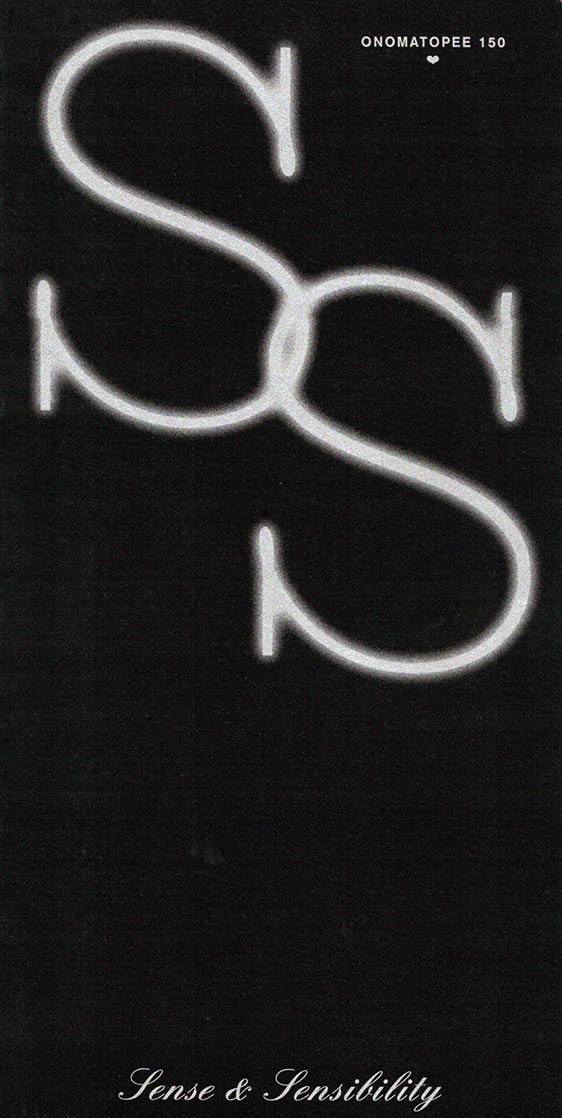
Sense & Sensibility
It’s because feminism has become a fashionable commodity now, that we’re in desperate need of a more inclusive and varied reflection on contemporary girlhood, gender equality struggles, and the relationship between gender, politics and philosophy.
This book documents the production and thought processes of 6 engaging artists and designers regarding the theme, and features a collection of essays by artists and academics, writers and rioteers, curators and journalists.
With contributions by Mandy Roos, Gabriel A. Maher with Roberto Pérez de Gayo and Carly Rose Bedford, Olle Lundin, Janina Frye, Camille Auer, Barbara Bolt, Daantje Bons, Charlotte van Buylaere, Ece Canlı and Luiza Prado de O. Martins, Victoria Ledig, Alicja Melzacka, Nina Power, Barbara Smith for Nasty Women and Aynouk Tan.
Edited and curated by Pernilla Ellens
Graphic design by Virginie Gauthier
Made possible thanks to the municipality of Eindhoven and the province of Noord-Brabant.
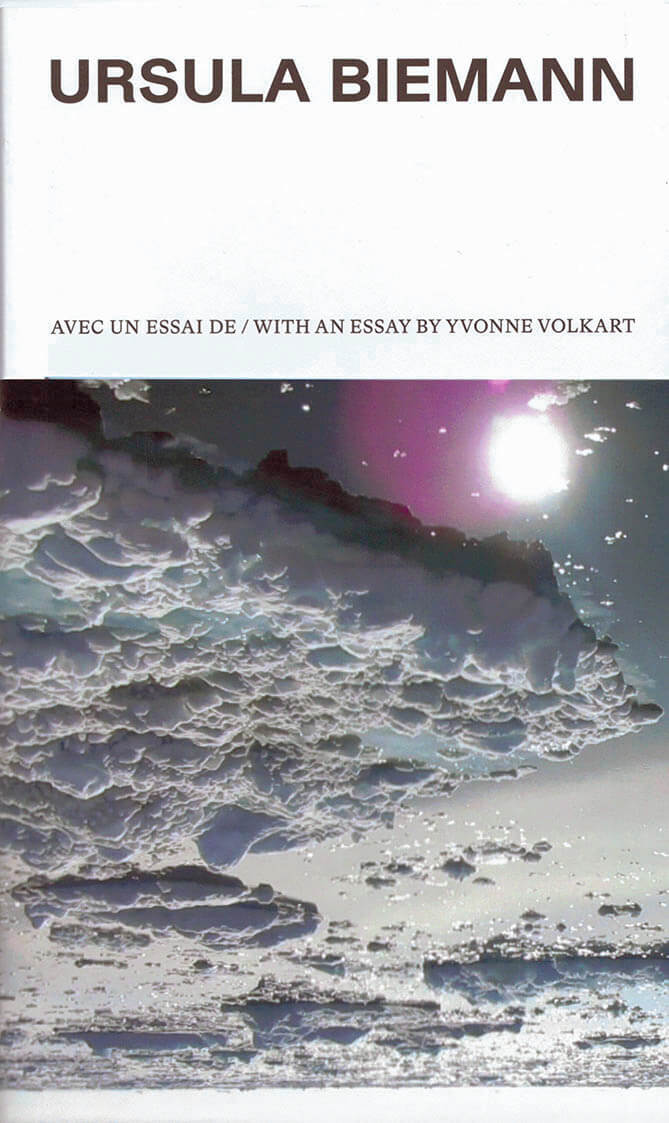
Ursula Biemann
A notebook based on Ursula Biemann's latest film, Acoustic Ocean, an expedition to the depths of the Arctic Ocean in search of interspecies communications.
32 p, ills colour, 14 x 23 cm, pb, French/English

Practice Space
This publication emerges from an effort to better understand the conditions of contemporary art in disparate places. Featuring new writings in a variety of discursive forms (commissioned essays, conversations, profiles), the book is organised around three key terms: local time, situated infrastructure, and “cotranslations”.
Furthermore, it gathers perspectives and approaches to “the local” from art initiatives that operate outside of conventional frameworks. As the authors consider place and context in terms of social, economic, political, and historical circumstances, their writings also reflect upon these notions as sites for different conceptions of the self in relation to the world.
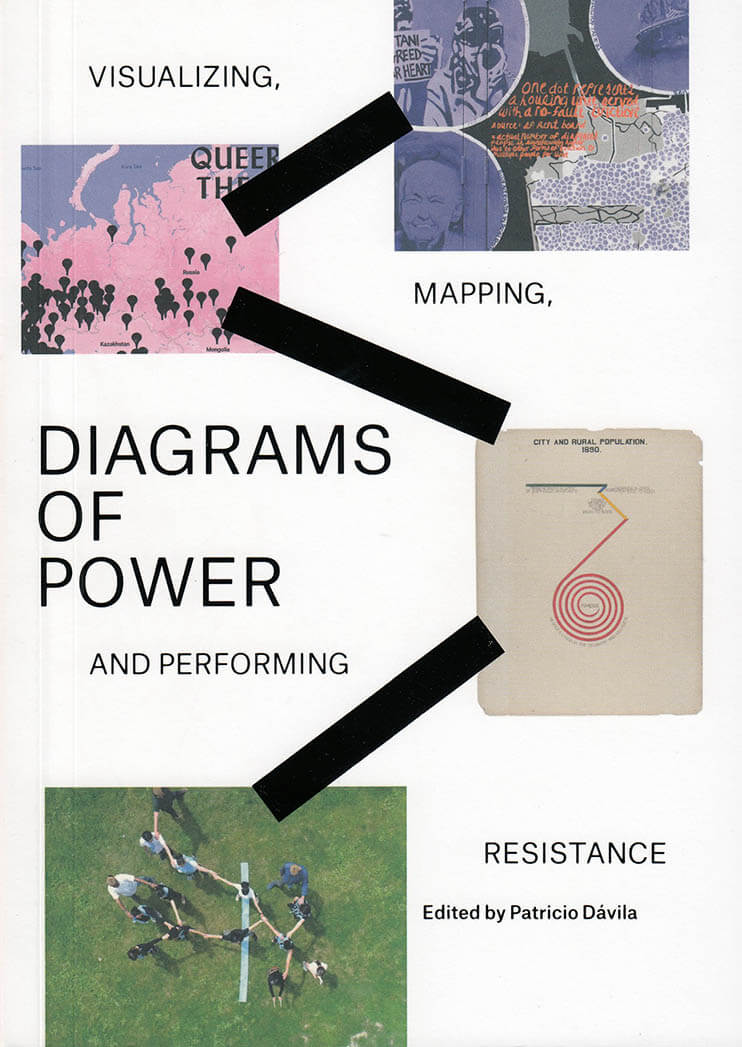
Diagrams of Power
Diagrams of Power: Visualizing, Mapping, and Performing Resistance, brings together the work of designers, artists, cartographers, geographers, researchers and activists who create diagrams to tell inconvenient stories that upset and resist the status quo.
Edited by Patricio Dávila. Words and works by Joshua Akers, Burak Arikan, Josh Begley, Joseph Beuys, Alexis Bhagat, Vincent Brown, Bureau d’Études, Teddy Cruz, Department of Unusual Certainties, Peter Hall, Alex Hill, W.E.B. DuBois, Patricio Dávila, Catherine D’Ignazio, Forensic Architecture, Fonna Forman, Terra Graziani, Iconoclasistas, Lucas LaRochelle, Eliana MacDonald, Julie Mehretu, Lize Mogel, Ogimaa Mikana, Margaret Pearce, Laura Poitras, Philippe Rekacewicz, Sheila Sampath, and Visualizing Impact.

Aphasia
Aphasia is a work of art about racism and intolerance, exposing the banality and triviality of evil. The films challenges us to look (literally) more attentively and to question our own individual and collective position. Aphasia is a call, not for punishment or outrage about the crimes committed during colonial times, the Holocaust or the atrocities in Bosnia during the Yugoslavian wars. Rather, it is a call to break the collective silence, and to actually look at the blind spots that seem to have become a fundamental part of our European identity.
Texts by Branka Benčić, Berber Bevernage and Eline Mestdagh, Jelena Jureša, Barbara Matejčić, Asa Mendelsohn, Rolf Quaghebeur.

The Against Nature Journal #1
Aimar Arriola, Grégory Castéra
THE AGAINST NATURE JOURNAL is a biannual arts and human rights magazine exploring “crime against nature” laws and their legacies, in print, in person, and online. Authors and readers from law, activism, social sciences, and the arts are brought together to foster dialogue on sexual and reproductive rights and rethink nature anew.
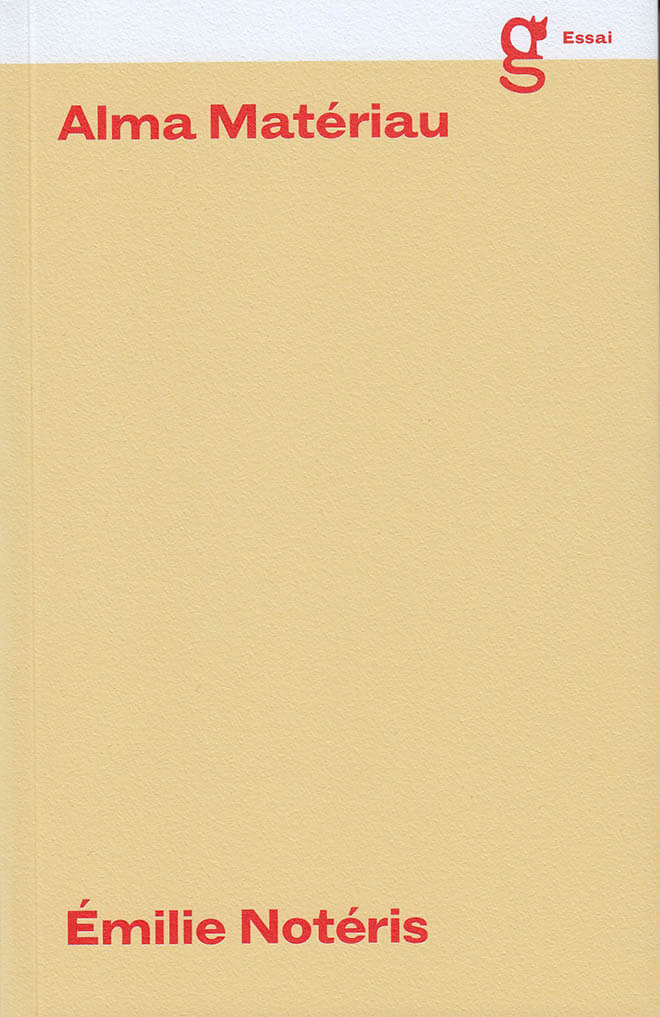
Alma Matériau
Émilie Notéris focuses her analysis on artworks created by women in the twentieth and twenty-first centuries, in a book that is at once literary, aesthetic and political.
On the occasion of its tenth anniversary, Paraguay creates a collection of essays and book-length interviews, published in, or translated into French. The books in this series are commissioned ones, books developed independently and freely, without a deadline. They articulate thoughts on art and political positions in the present through situated and experimental literary writing.
Émilie Notéris (born 1978) is an essayist, science fiction author, and translator.
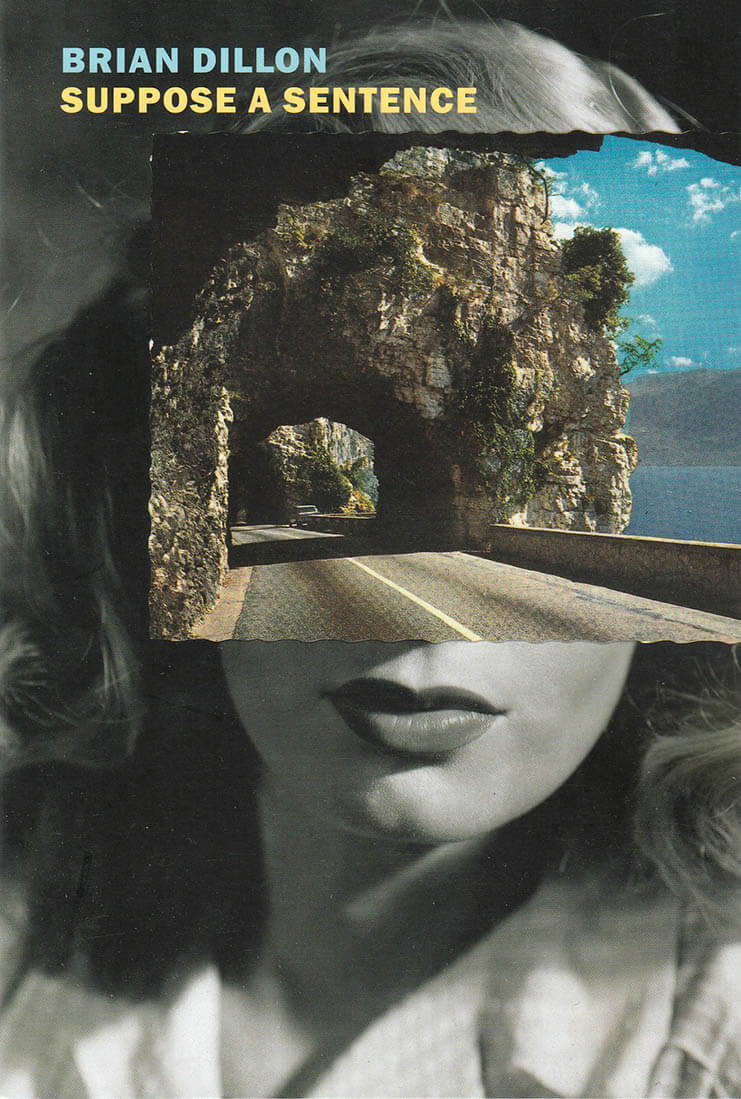
Suppose a Sentence
A captivating meditation on the power of the sentence by the author of Essayism, a 2018 New Yorker book of the year. In Suppose a Sentence, Brian Dillon, whom John Banville has called "a literary flâneur in the tradition of Baudelaire and Walter Benjamin," has written a sequel of sorts to Essayism, his roaming love letter to literature. In this new book Dillon turns his attention to the oblique and complex pleasures of the sentence. A series of essays prompted by a single sentence—from Shakespeare to Janet Malcolm, John Ruskin to Joan Didion—the book explores style, voice, and language, along with the subjectivity of reading. Both an exercise in practical criticism and a set of experiments or challenges, Suppose a Sentence is a polemical and personal reflection on the art of the sentence in literature. Whether the sentence in question is a rigorous expression of a state of vulnerability, extremity, even madness, or a carefully calibrated arrangement, Dillon examines not only how it works and why but also, in the course of the book, what the sentence once was, what it is today, and what it might become tomorrow.
Brian Dillon was born in Dublin in 1969. His books include The Great Explosion (short-listed for the Ondaatje Prize), Objects in This Mirror: Essays, I Am Sitting in a Room, Sanctuary, Tormented Hope: Nine Hypochondriac Lives, In the Dark Room, and with New York Review Books, Essayism. His writing has appeared in The Guardian, The New York Times, the London Review of Books, The Times Literary Supplement, Bookforum, Frieze, Artforum, 4Columns, and The Yale Review. He is the UK editor of Cabinet magazine and teaches creative writing at Queen Mary University of London.
Published 2020

A Bernadette Mayer Reader
A Bernadette Mayer Reader collects texts that were originally published in small press books and chapbooks, magazines, and anthologies. The book holds poetry and prose from Mayer’s earliest works to then-contemporary publications. From Story (1968), to excerpts from Desires of Mothers and Midwinter Day (1982), and including a cache of new poems, this is a sprawling, surprising collection of Mayer at her best.
The reader was met with praise from peers and critics alike. In the words of Jackson Mac Low, "[Mayer] never gets stuck in one place - she changes as the spirit moves her- and her structural inventions and self-revelations provoke surprise and delight."
Of the publication, Fanny Howe writes, "America could prove that her conscience, heart, and intelligence are still operating with this one volume of poetry."
Bernadette Mayer was born in Brooklyn, New York, in 1945. A most prolific poet, her first book was published at the age of twenty-three. Many texts later she continues to write progressive poetry from her home in East Nassau, New York. For many years Mayer lived and worked on the Lower East Side of Manhattan where she was the Director of St. Mark's Poetry Project from 1980-1984. Bernadette Mayer has received grants and awards from PEN American Center, The Foundation for Contemporary Performance Art, the NEA, The Academy of American Poets, and The American Academy of Arts and Letters.
Published 1992
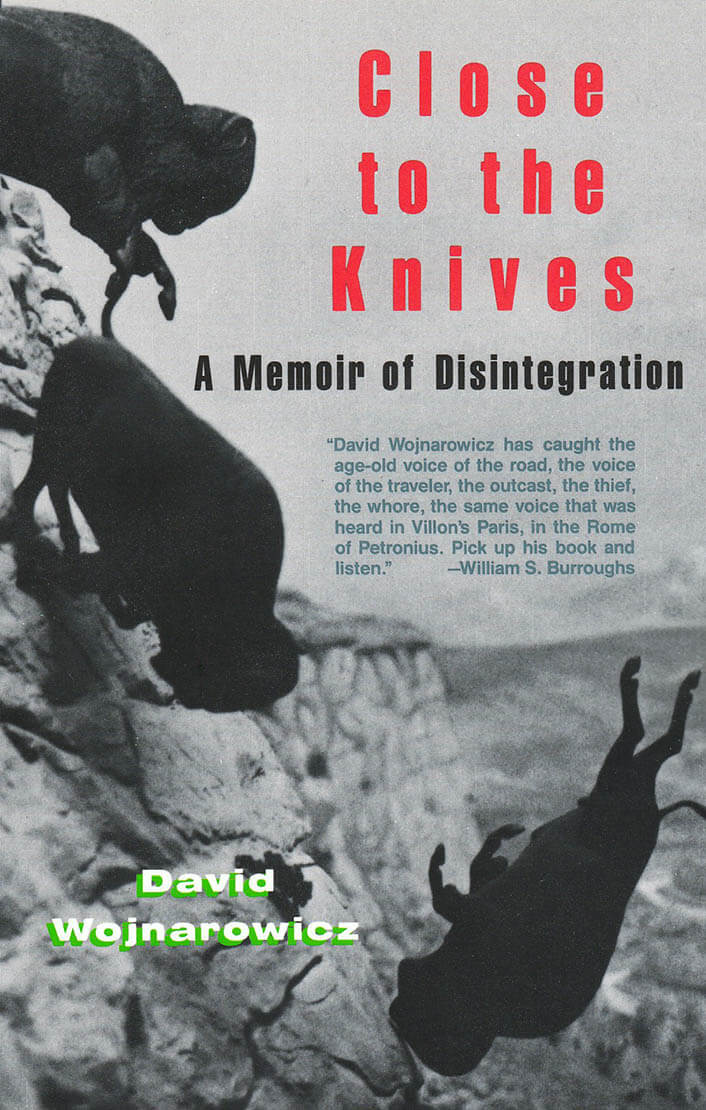
Close to The Knives
In Close to the Knives, David Wojnarowicz gives us an important and timely document: a collection of creative essays — a scathing, sexy, sublimely humorous and honest personal testimony to the "Fear of Diversity in America." From the author's violent childhood in suburbia to eventual homelessness on the streets and piers of New York City, to recognition as one of the most provocative artists of his generation — Close to the Knives is his powerful and iconoclastic memoir. Street life, drugs, art and nature, family, AIDS, politics, friendship and acceptance: Wojnarowicz challenges us to examine our lives — politically, socially, emotionally, and aesthetically.
David Wojnarowicz was an American painter, photographer, writer, filmmaker, performance artist, and AIDS activist prominent in the New York City art world. He was born on September 14, 1954. He died of AIDS on July 22, 1992.
published 1991
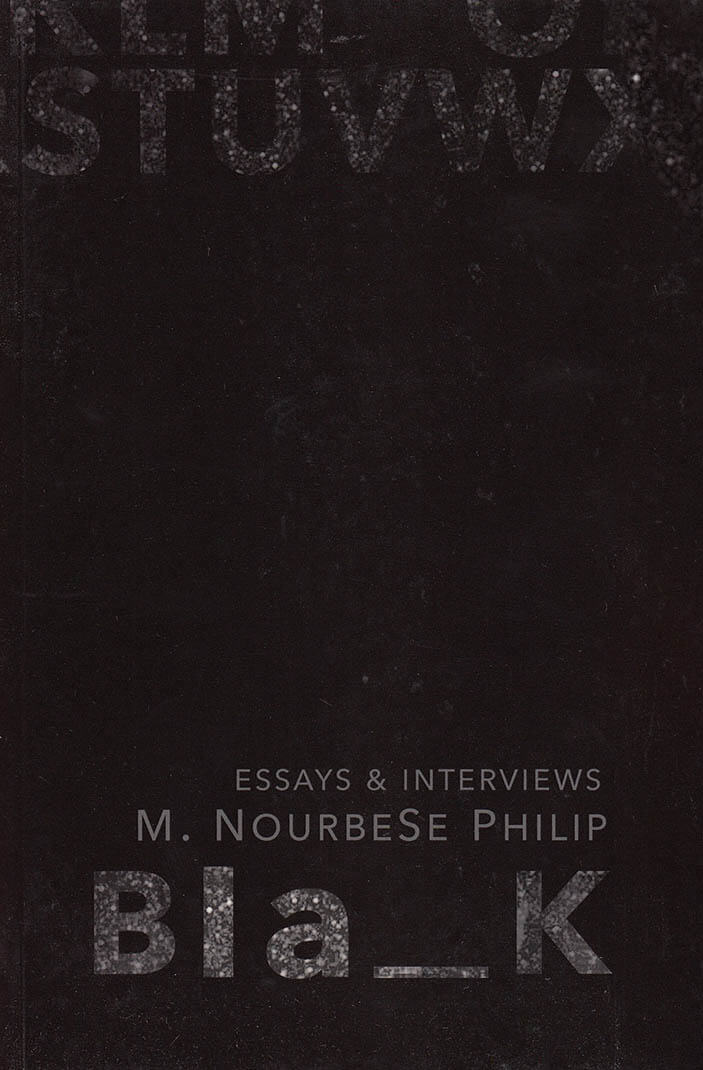
Bl_nk: essays and interviews
BLANK is a collection of previously out-of-print essays and new works by one of Canada's most important contemporary writers and thinkers. Through an engagement with her earlier work, M. NourbeSe Philip comes to realize the existence of a repetition in the world: the return of something that, while still present, has become unembedded from the world, disappeared. Her imperative becomes to make us see what has gone unseen, by writing memory upon the margin of history, in the shadow of empire and at the frontier of silence.
In heretical writings that work to make the disappeared perceptible, BLANK explores questions of race, the body politic,timeliness, recurrence, ongoingness, art, and the so-called multicultural nation. Through these considerations, Philip creates a linguistic form that registers the presence of what has seemingly dissolved, a form that also imprints the loss and the silence surrounding those disappearances in its very presence.
M. NourbeSe Philip is a poet, essayist, novelist, playwright, and former lawyer who lives in Toronto. She is a Fellow of the Guggenheim and Rockefeller (Bellagio) Foundations, and the MacDowell Colony. She is the recipient of many awards, including the Casa de las Americas prize (Cuba). Among her best-known works are: She Tries Her Tongue, Her Silence Softly Breaks, Looking for Livingstone: An Odyssey of Silence, and Zong!, a genre-breaking poem that engages with ideas of the law, history, and memory as they relate to the transatlantic slave trade.
published 2017

The Imaginary Republic
The Imaginary Republic is an artistic research project focusing on questions of social practice. In particular, it considers the creative and restless imaginaries underpinning our political selves and argues for a deeper engagement with what Elena Loizidou terms “dream-action”: the figurative and poetic staging of world making activity.
The publication brings together participating artists Tatiana Fiodorova, Octavio Camargo / Brandon LaBelle, the Sala-Manca Group, and Joulia Strauss, whose practices engage situations of struggle and autonomous cultures through a range of methods and approaches. From social fictioning to camouflaged interventions, collaborative pedagogies to gestures of care, their works propose unlikely paths of mutuality. The publication includes documentation of an exhibition held at Kunsthall 3,14 in Bergen, as well as key essays and works by theorists and artists Rhiannon Firth, Hélène Frichot, Marysia Lewandowska, Gerald Raunig, Raimar Stange with Oliver Ressler, and Manuela Zechner.
published in June 2020
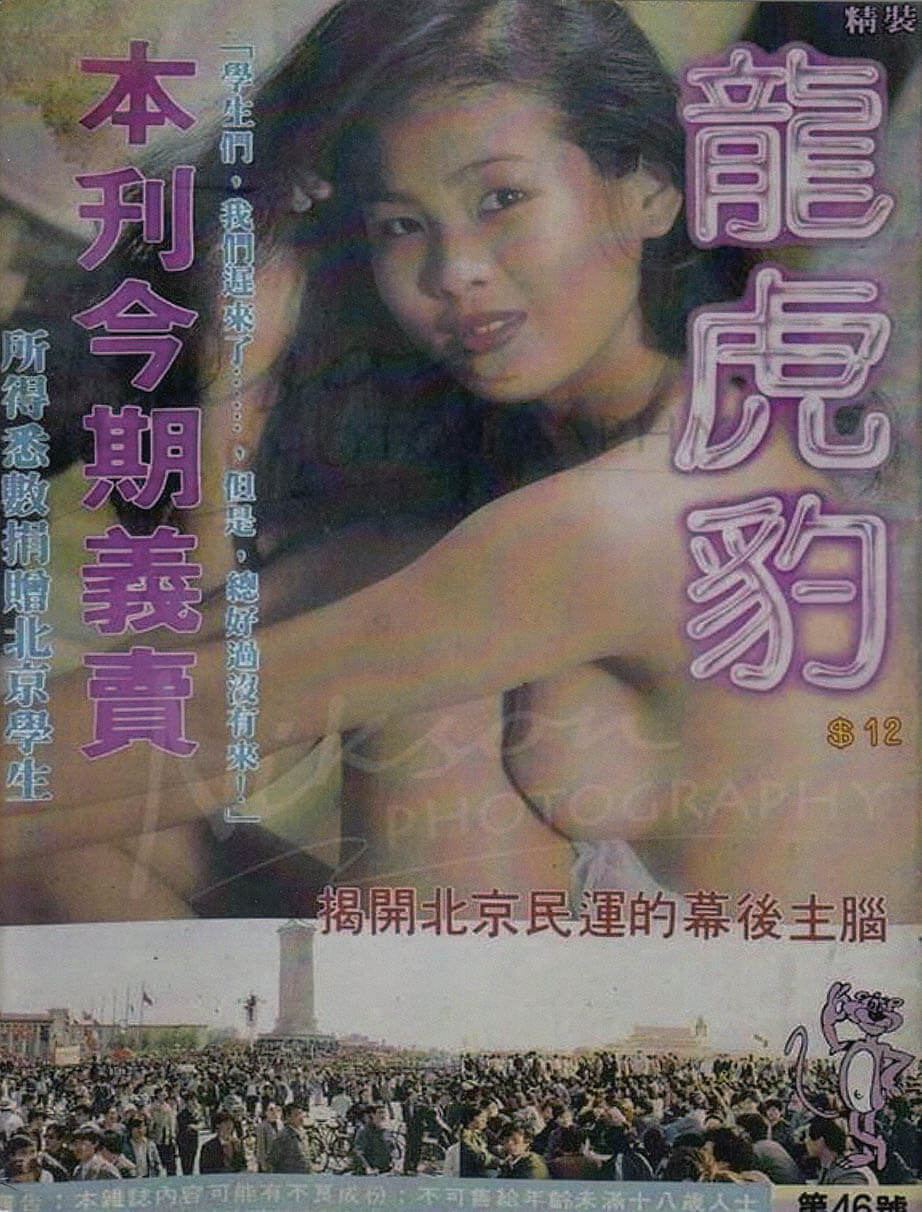
(Salty Wet)
咸濕 (Salty Wet) - an anti-travelogue essay on distance and desire within and without Hong Kong
“There is no Hong Kong anymore.” These four words have been on the lips of my colleagues, friends and family. Even if you have never been, every Chinatown is a facsimile of Hong Kong. The city’s specter also lives in pop culture, movies and cantopop and video games, and in these projections, we live its simulacrum. In history, dead cities have their morbid enigma and mythology from Pompeii to Rome. But if I could find coherence in living through political decay, outside of the frameworks of news journalism or historiography, then perhaps I would be able to find a more human way to mourn Hong Kong."
T▇▇ 謝▇ is an independent film producer based between Hong Kong and New York and the founder of Speculative Place. She was the Executive Producer of Adam Khalil and Bayley Sweitzer’s feature debut film Empty Metal, and the forthcoming documentary film, Ancestors in the Archives, directed by Adam and Zack Khalil. 謝 is pronounced SHä (as in Shanghainese).
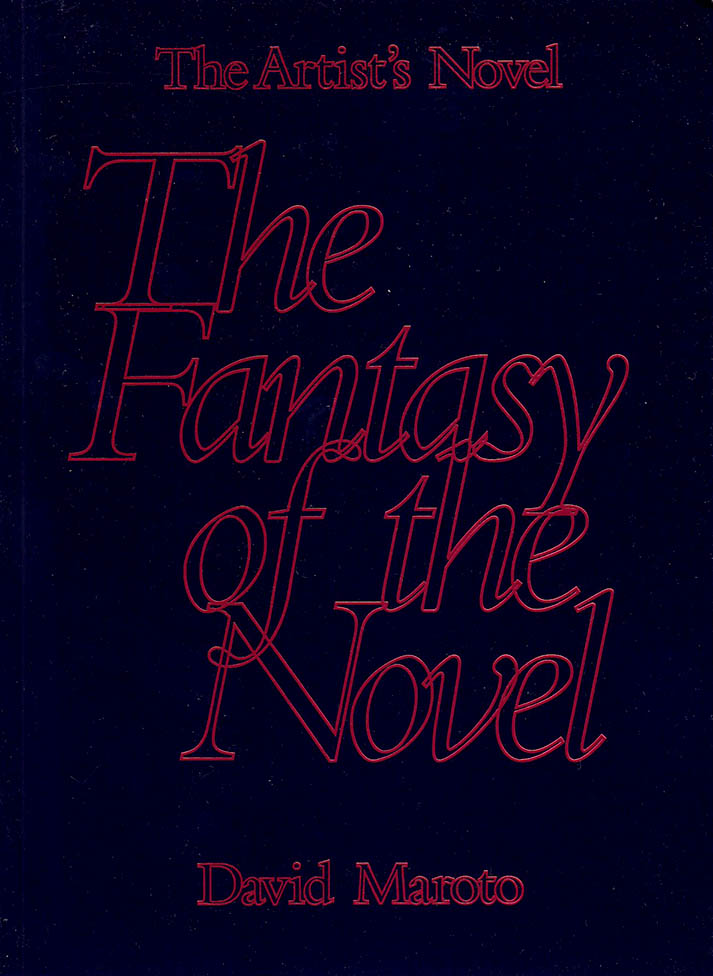
The Fantasy of the Novel
Second volume of a publication dedicated to the artist's novel, this metafiction follows a detective investigating the conditions of production of a novel within an artistic framework.
Why do artists write novels? What impact does the artist's novel have on the visual arts? How should such a novel be experienced? In recent years, there has been a proliferation of visual artists who create novels as part of their broader art practice. They do so in order to address artistic issues by means of novelistic devices, favoring a sort of art predicated on process and subjectivity, introducing notions such as fiction, narrative, and imagination. In this sense, it is possible to see the novel as a new medium in the visual arts; yet very little is known about it. This two-volume publication is the first to explore in depth the subject of the artist's novel.
The Fantasy of the Novel, is a research project in the form of a novel; it examines the process of creating an artist's novel derived from five episodic performances and an exhibition. The creative process was affected by the circumstances of production, including intersubjective relationships usually invisible to audiences. The protagonist assumes the role of a detective who tries to understand the conditions under which an artist decides to write, and how this writing is possible within an artistic setting.
David Maroto (born 1976, lives and works in Rotterdam) is a Spanish visual artist, researcher, writer, and curator. He is the co-curator of The Book Lovers, a research project on the artist's novel, together with Joanna Zielińska.
Published 2020

The Other Citizen
Drawing upon traditions of socially engaged poetics, Brandon LaBelle's The Other Citizen presents narratives of contemporary crisis and exclusionary politics—from American teenagers in the maze of neoliberal privatization to those caught between borders of nation-states—outlining the force of a planetary citizenry.
Brandon LaBelle is a musician, artist, writer, theorist, curator and editor (founder of Errant Bodies). His work is based on performance, sound installation, recording and use of found sounds. LaBelle reflects fluently on his artistic practice, drawing attention to the social dimensions of listening and manner in which sounds, in multiple variations, play upon public spaces, and drawing connections across media and incorporate video, as well as architectural and sculptural vocabularies into an expanded field that embraces rhetorical and spatial challenges.
Published September 2020.

The Nomadic Listener
Based on the author's artistic research on migration, contemporary urban experience, and sonic alienation, The Nomadic Listener is composed of a series of texts stemming from psychogeographic explorations of contemporary cities, including Copenhagen, Berlin, Kolkata, Vienna, Delhi, Hong Kong, Mumbai, and New York, among others.
Each text is an act of listening, where the author records his surrounding environment and attunes to the sonic fluctuations of movement and the passing of events. What surfaces is a collection of meditations on the occurrences of life movingly interwoven with memories, associations, desires and reflections. As readers we are brought into a tender map of contemporary urban experience, and the often lonely, surprising, and random interactions found in traveling. The Nomadic Listener includes parallel drawings based on the original audio recordings, and appear as ghostly renderings of the corresponding experiences. The recordings are published by Gruenrekorder and accessed through a QR code included in the book.
Budhaditya Chattopadhyay is a contemporary artist, researcher, writer and theorist. Incorporating diverse media, such as sound and moving image, Chattopadhyay produces works for large-scale installation and live performance addressing urgent issues such as the climate crisis, human intervention in the environment and ecology, migration, race, and decolonization.
published September 2020.
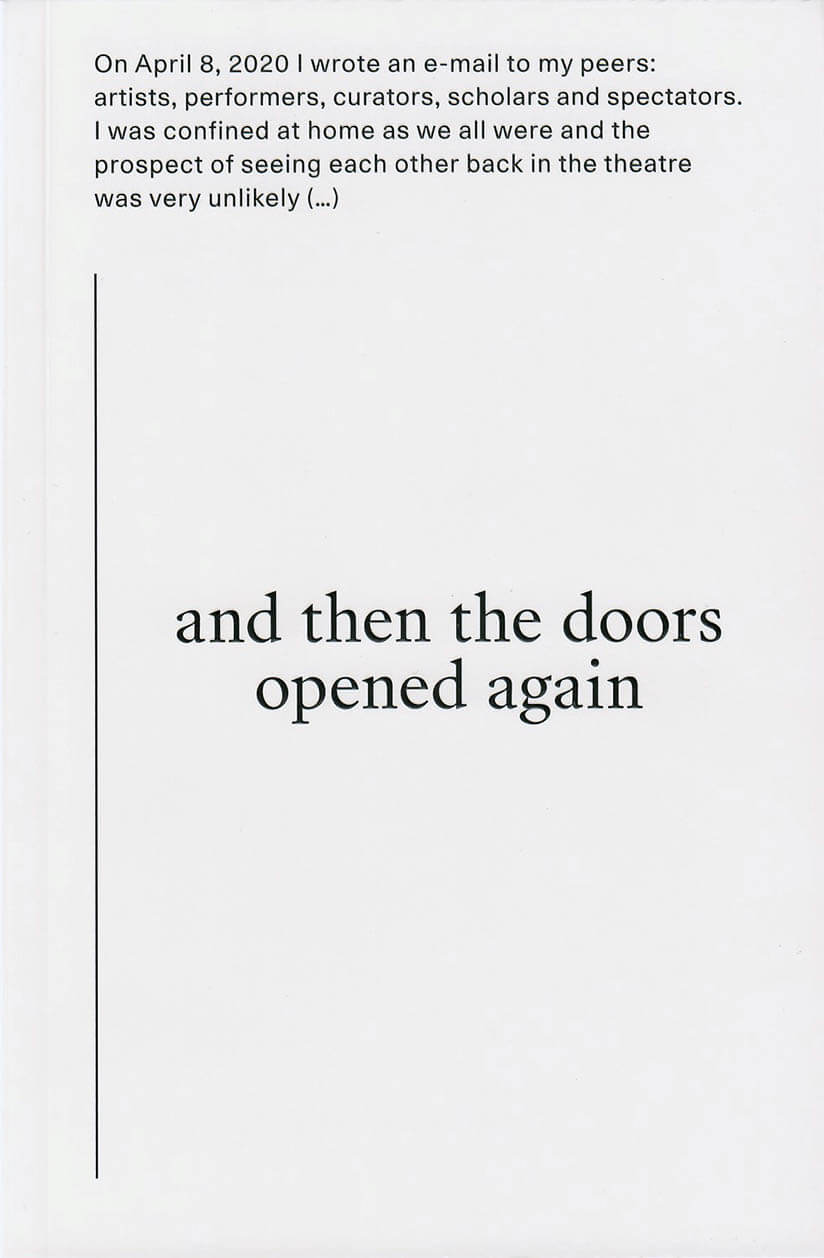
and then the doors opened again
Locked down at home during the first wave of Covid-19, David Weber-Krebs kept on thinking about the day when theatres would open their doors again. At that point, it was somehow difficult to even picture that moment.
On the 8th of April, 2020, in the middle of the lockdown, David sent an e-mail to his peers: artists, scholars, curators, and spectators belonging to different art communities. In this e-mail, there was a simple question: What will happen on your first theatre visit after the lockdown?
It was an invitation to imagine the future of theatre from this very specific moment when theatres were all closed and when it was not clear how and when and if they would open again.
With contributions by: Paula Almiron, Kristof van Baarle, Sven Age Birkeland, Antonia Baehr, Caroline Barneaud, Nicole Beutler, Maaike Bleeker, Julien Bruneau, Pieter De Buysser, Alondra Castellanos, Chloé Chignell, Amélie Coster, Jasper Delbecke, Zoë Demoustier, Wouter De Raeve, Charlotte De Somviele, Katja Dreyer, Jeroen Fabius, Silvia Fanti, Far, Nicolas Galeazzi, Emilie Gallier, Nada Gambier, Melih Gencboyaci, Konstantina Georgelou, Kristof van Gestel, Matthieu Goeury, Maximilian Haas, Ant Hampton, David Helbich, Marijke Hoogenboom, Rita Hofwijk, Breg Horemans, Asa Horvitz, Dolores Hulan, Mette Ingvartsen, Myriam Van Imschoot and Marcus Bergner (MM), Stefan Kaegi, Edyta Kozak, Bojana Kunst, Rudi Laermans, Sarah van Lamsweerde, Heike Langsdorf, Mylène Lauzon, André Lepecki, Kopano Maroga, Ivana Müller, Phoebe Osborne, Leonie Persyn, Julie Pfleiderer, Antoine Pickels, Amanda Piña, Jan-Philipp Possmann, Fransien van der Putt, Irena Radmanovic, Anna Rispoli, Martina Ruhsam, Jonas Rutgeerts, Nienke Scholts, Ula Sickle, Michael Simon, Karoline Skuseth, Lara Staal, Christel Stalpaert, Danae Theodoridou, Pankaj Tiwari, Vera Tussing, Marie Urban, Michiel Vandevelde, Hidde Aans Verkade, Mathilde Villeneuve, Georg Weinand, Stefanie Wenner, Siegmar Zacharias, Andros Zins-Browne.

on the future and the artist-run spaces
Artists, curators and writers describe their vision on the role of artist-run spaces for the future and discuss their own position in the world of art. The authors weigh in on the importance of artist-run spaces and reach out to anyone looking for alternative ways of thinking, working and living together.

a queer anthology of healing
a queer anthology of healing is a subtle, devastating mix of cuteness and embarrassment, beauty and confession, magic tricks and pain. The artworks and writings in this collection suggest that healing can be achieved through revelation, invocation, observation and disclosure. It’s a much-needed gift right now. - Chris Kraus
with Clay AD, Harry Agius, Barney Ashton-Bullock, Bodie Bellamy, Jack Bigglestone, Nick Blackburn, Helen Cammock, Charity Coleman, Swithun Cooper, Paul Gabrielli, Evan Garza, Erica Gillingham, Daniel Givens, Pete Hammond, Benedict Hawkins, Georgie Henley, Lubaina Himid, Fanny Howe, Jasmine Johnson, G.B. Jones, Kevin Killian, Wayne Koestenbaum Nic Lachance Olivia Laing, Benedict Leader, Paul Lee, Mary Manning, Ben Miller, D. Mortimer, Monique Mouton, Annie Murrells, Chuck Nanney, David Nas, Isobel Neviazsky,Paul P. , Richard Porter,Peter Scalpello, Hyacinth Schuss, Ryan Skelton, Verity Spott, Edward Thomasson, Timothy Thornton, Declan Wiffen, Ian Wooldridge

Just Us: An American Conversation
As everyday white supremacy becomes increasingly vocalized with no clear answers at hand, how best might we approach one another? Claudia Rankine, without telling us what to do, urges us to begin the discussions that might open pathways through this divisive and stuck moment in American history.
Just Us is an invitation to discover what it takes to stay in the room together, even and especially in breaching the silence, guilt, and violence that follow direct addresses of whiteness. Rankine’s questions disrupt the false comfort of our culture’s liminal and private spaces—the airport, the theater, the dinner party, the voting booth—where neutrality and politeness live on the surface of differing commitments, beliefs, and prejudices as our public and private lives intersect.
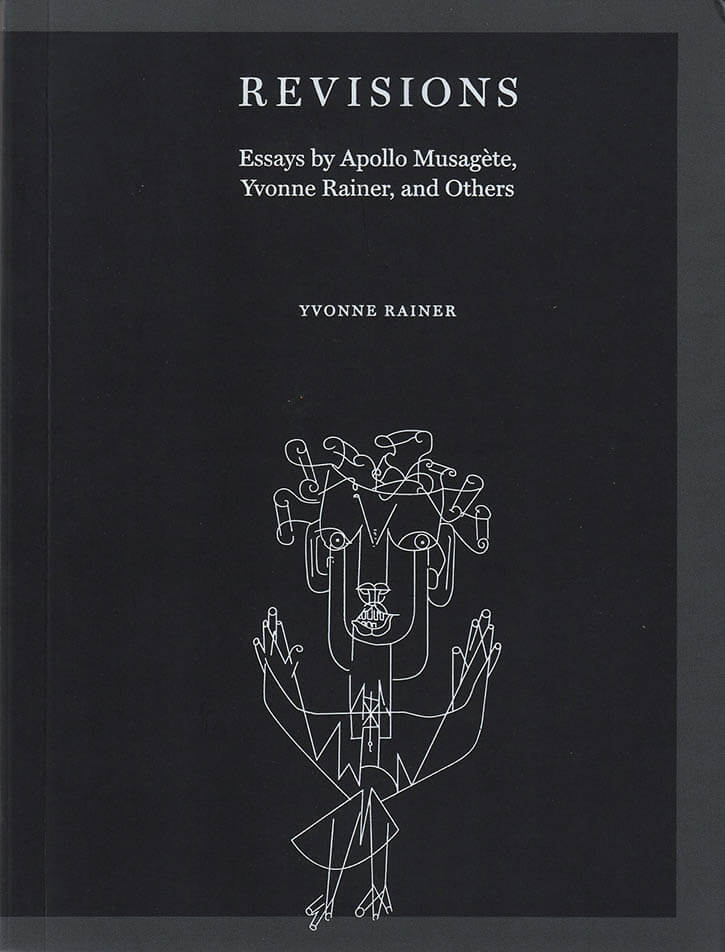
Revisions
The final iteration of Rainer's dance rant A Truncated History of the Universe for Dummies, accompanied by texts offering a real-time account of Rainer's creative process.
Choreographer and filmmaker Yvonne Rainer has long investigated the ways in which movement can be a political act in and of itself—on the stage, on the screen, or at the lectern. In Revisions, Rainer pushes her interest in embodied activism to a new arena: what she calls the “dance rant.” This volume includes the final iteration of Rainer's latest dance rant, entitled A Truncated History of the Universe for Dummies. This performance piece evolved in live presentations in Dublin, Stockholm, and New York before being expanded and adapted in written form here. In this now-completed work, Rainer mobilizes her rage and bafflement at contemporary political events through the guise of Apollo, Leader of the Muses.
Revisions also includes a compilation of emails and diary entries that provide a real-time account of Rainer's process of creating and workshopping a dance. “Pedagogical Vaudeville 3” reveals Rainer's consistent interest in reworking and reconsidering material across multiple mediums, formats, and contexts, and offers a unique glimpse at the working methods of one of this century's preeminent dance artists.
Bookended with an introduction by artist and scholar Gregg Bordowitz and an analysis of Rainer's AG Indexical with a Little Help from H. M. by dance historian Anna Staniczenko, these texts serve not only as a revision of the conventional understanding of five decades of Rainer's production, but also as a timely manual for performance as an act of resistance.

Thresholes
THRESHOLES is both a doorway and an absence, a road map and a remembering. In this almanac of place and memory, Lara Mimosa Montes explores the passage of time, returning to the Bronx of the ’70s and ’80s and the artistry that flourished there. What is the threshold between now and then, and how can the poet be the bridge between the two? Just as artists of that time highlighted what was missing in the Bronx, this collection examines what is left open in the wake of trauma and loss.
Lara Mimosa Montes is a writer based in Minneapolis and New York. Her poems and essays have appeared in Academy of American Poets’ Poem-A-Day, BOMB, Boston Review, Hyperallergic, Jacket2, and elsewhere. She is a 2018 McKnight Writing Fellow and CantoMundo Fellow. She holds a PhD in English from The Graduate Center, City University of New York. Currently, she works as a senior editor of Triple Canopy. She was born in the Bronx.
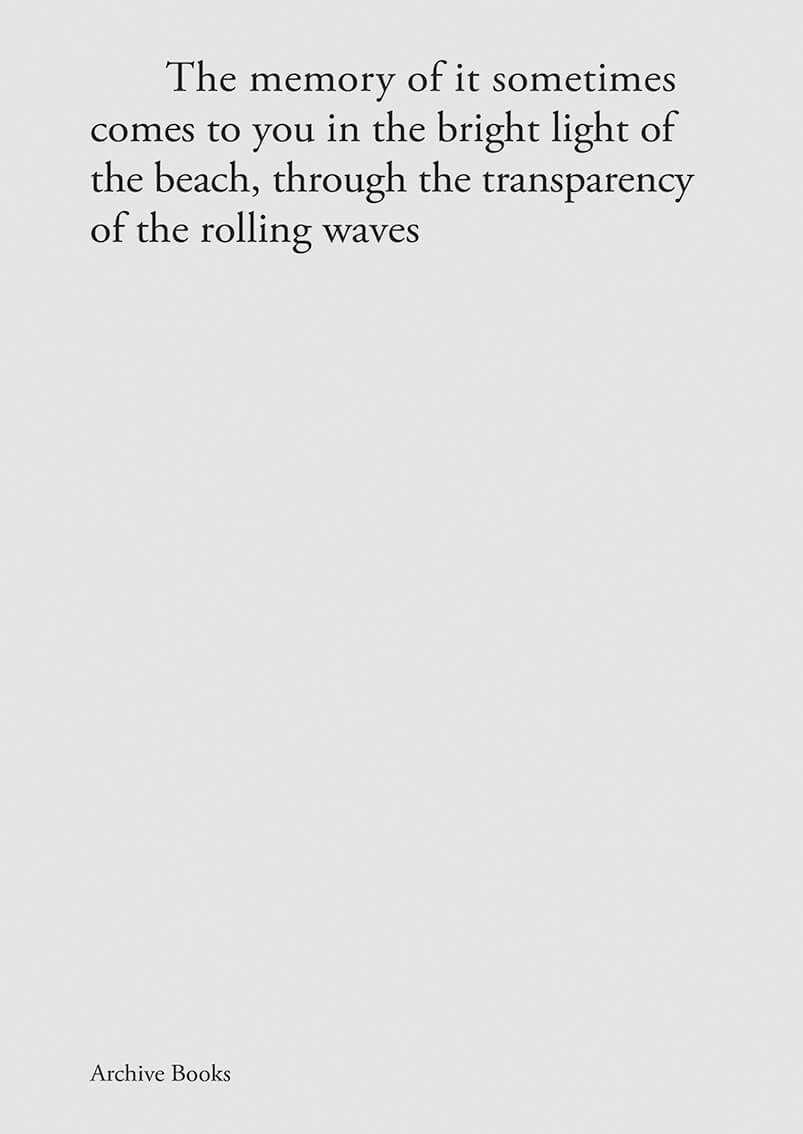
Encircling the Image of Trauma
This book tiptoes between aesthetics and ethics; it proposes to rethink trauma in its necessity as well as impossibility to be represented and understood.
The traumatic experience of violence marks social orders and imbues history. How does it reach beyond distress and pain? This collection of works interrogates alternative narratives: The traces of trauma may also comprise a subversive potential, which withdraws from the hold of power and instead makes room for a sense of history's vulnerability.
Thoughts, artistic contributions and text, most of them produced especially for this volume, move around notions of trauma, in an attempt to encircle moments, at which translation of meaning seems suddenly suspended.
Contributions by Pavel Büchler, Anca Benera & Arnold Estefan, Wendelien van Oldenborgh, Jenny Edkins, Aurélien Gamboni & Sandrine Teixido, Unica Zürn, Falke Pisano, Katja Mater, Georges Perec, Andrea Bellu, Ben Seymour, Natascha Sadr Haghighian, Gitte Villesen.
Published with Centre d'Art Contemporain Genève.
published in March 2020
English edition
13 x 20 cm (softcover)
240 pages (ill.)
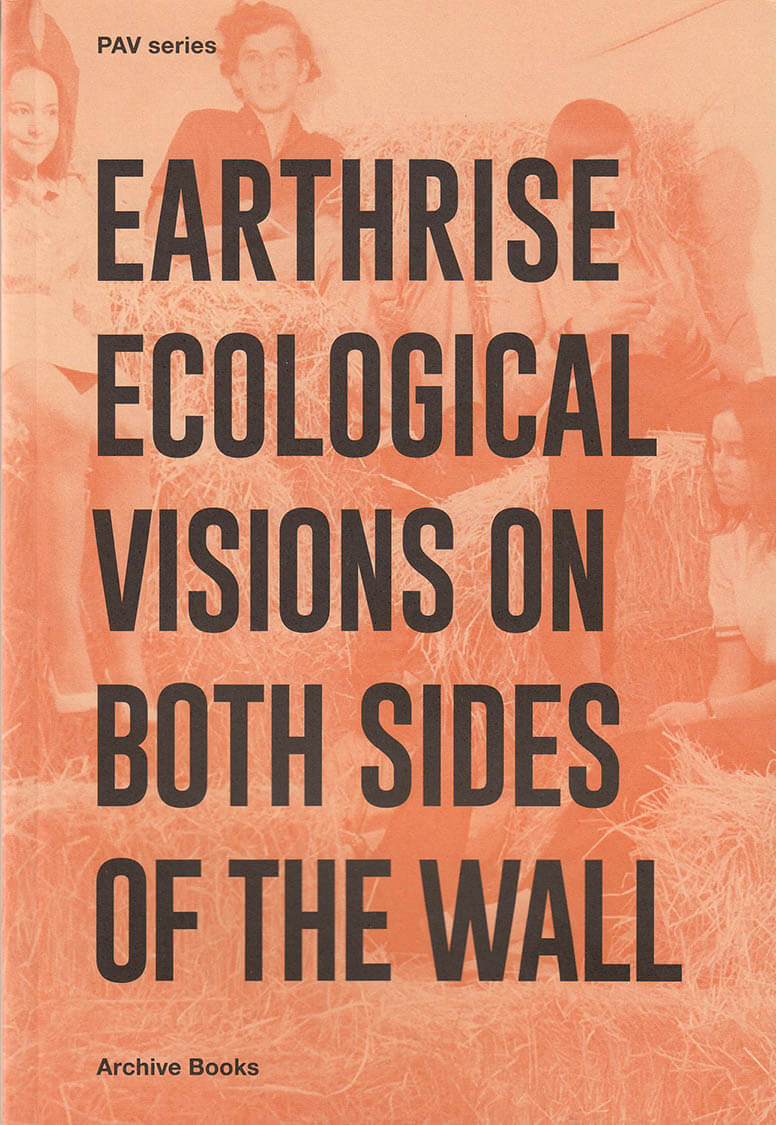
Earthrise
There is no question that ecological ideas acquired a central role in contemporary episteme. In contrast, the heuristic function that these ideas can assume in the current polarisation is questionable: that which, over the last decade, has identified the environmental crisis with the (categorical and totalitarian) concept of the Anthropocene.
Ecological discourse positioned itself inside historically situated trajectories that contributed to the transformation of aesthetical paradigms and political practices. In the scenario that 1968 opened up, the transversal nature of subjectivity allowed it to cover different fields, beginning with the tension between the logic of a unitary discourse and the creation of a multiplicity of possible worlds, between the molar and the molecular, the micro and the macro.
Ecological thought, as such, cannot help but conflict with that which is assumed to be homogeneous and constant, with that which forces the earth to be centred, measured, and expropriated, just as life must be biogenetically controlled, colonised, and subjected to patriarchy.